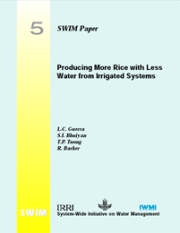Producing more rice with less water from irrigated systems.
Citation:
Guerra, L. C.; Bhuiyan, S. I.; Tuong, T. P.; Barker, R. 1998. Producing more rice with less water from irrigated systems. Colombo, Sri Lanka: International Irrigation Management Institute (IIMI) v, 24p. [SWIM paper 5
Abstract
Over the past decade, we have witnessed a growing scarcity of and competition for water around the world. As the demand for water for domestic, municipal, industrial, and environmental purposes rises in the future, less water will be available for agriculture. But the potentials for new water resource development projects and expanding irrigated area are limited. We must therefore find ways to increase the productivity of water used for irrigation. This paper reviews the literature on irrigation efficiency and on the potential for increasing the productivity of water in rice-based systems. It stresses the continuing confusion over the concepts of irrigation efficiency and water productivity. It identifies the reasons for the wide gap between water requirement and actual water input (both irrigation diversions and rainfall) in irrigated rice production systems and discusses potential opportunities for increasing water productivity both on-farm and at the system level. Based on the reported low farm and system level irrigation efficiencies, the potentials for water savings in rice production appear to be very large. But we do not know the degree to which various farm and system interventions will lead to sustainable water savings in the water basin until we can quantify the downstream impact of the interventions. Studies on the economic benefits and costs, and environmental aspects of alternative interventions are also lacking. This paper emphasizes the need to measure the productivity of water at farm, system, and basin levels, and to understand how the productivity at one level relates to the productivity at another. Without water balance studies to measure productivity at these different scales, it is not possible to identify the potential economic benefits of alternative interventions and the most appropriate strategies for increasing irrigation water productivity in rice-based systems.


